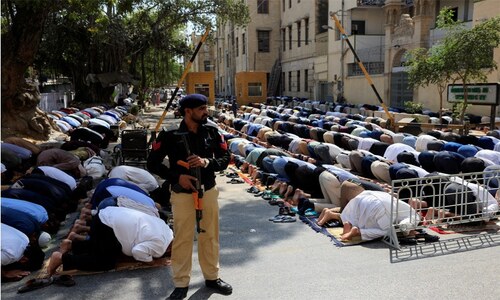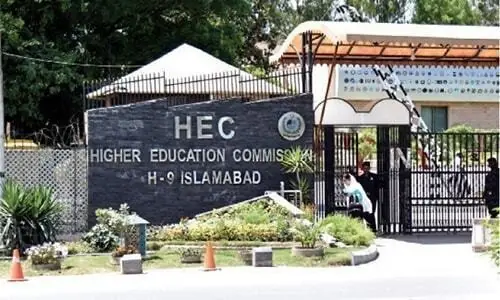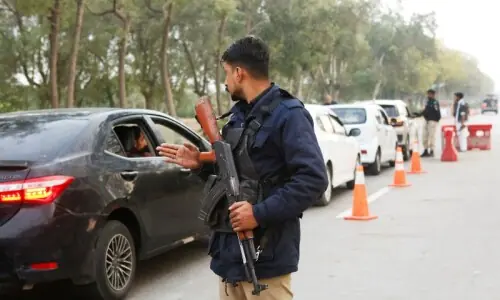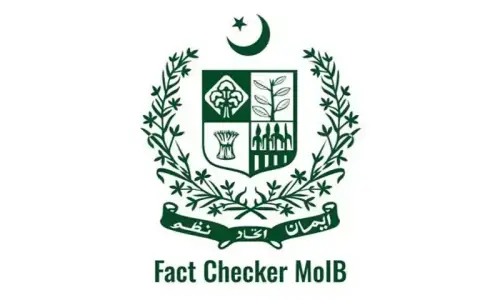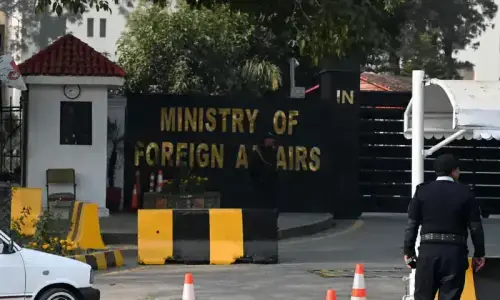KARACHI, March 20: Speakers at the launch of a study on minority women in Pakistan on Tuesday stressed the need for further research on problems of the religious minorities to sensitise government representatives as well as the people to this most-marginalised segment of society.
The study mapping the lives of women belonging to the minority communities – titled Life on the margins – has been conducted by the National Commission for Justice and Peace (NCJP), a Lahore-based human rights advocacy organisation established by the Pakistan Catholic Bishops’ Conference.
According to the study leaders — Jennifer Jag Jivan and Peter Jacob — the scope for data collection for the survey was limited to Punjab and Sindh, where 95 per cent of the minorities live. The survey, which was funded by the UN Women, also confined itself to women belonging to the Hindu and Christian communities, which comprise around 92 per cent of the entire minority population according to official estimates.
Newly appointed archbishop Joseph Coutts (Catholic Archdioceses of Karachi) appreciated the work, describing it as a well-documented survey whose findings should be regarded as credible and authoritative.
On the issue of reported abductions, forced marriages and conversions to Islam, particularly of Hindu girls/women, which was also touched upon by a couple of other speakers, the archbishop said the NCJP should conduct another survey exclusively in that regard.
The study, besides informing readers about minority population in general, the policy framework pertaining to minority women and the state of their human rights, also reviewed literature available on them. Issues such as legal disparity, review of personal laws concerning minorities, religious and gender biases, forced conversions, lack of policy focus and segregated data are examined in the study.
Highlighting the findings of the survey conducted in eight districts of Punjab and 18 districts in Sindh during 2010-11, Nabila Feroze, one of the organisers, said the living (housing, civic facilities) and economic conditions assessed through income, savings, health and education also placed minority women on the margins of social and economic development.
As per the report’s findings, as many as 76 per cent of the minority women had faced sexual harassment, while 43pc complained of facing religious discrimination at workplaces, educational institutions and in their neighbourhoods.
It was further said that most minority children were forced to take Islamic studies for lack of appropriate alternatives, while 27pc of the minority women surveyed faced discrimination in gaining admission to educational institutions.
The research, based on interviews of minority women, also revealed a higher infant mortality rate of 8.7 per cent than the general population. About 60pc said they suffered from diseases on account of the quality of water available to them.
Although 55pc of the minority women saw the social environment as conducive to multi-religious living, around 62pc said that in the wake of religious disturbances in some parts of the country, the majority community would not stand with them.
Significantly, over 30pc of the respondents did not answer questions that may be “sensitive” or revealing of their suffering.
The survey team recommended the mainstreaming of minority women to integrate them in the political processes at all levels and society at large. It also suggested that political parties make provisions in their manifestoes for proactive steps such as reserving seats for minority women in local bodies, senate, national and provincial assemblies and undertaking programmes for their socio-economic empowerment at governmental and non-governmental levels.The promotion of literacy among minority women, review of curriculum and implementation of five per cent quota allocated by the federal government under the vigilance of a monitoring body was demanded and the creation of employment opportunities for minority women was also stressed in the report.
Furthermore, according to the report, discriminatory and religion-specific parts of Constitution and the criminal law inter alia, blasphemy laws, in the country should be reviewed and amended to remove discrimination and provide justice without delay.
“Existing family or personal laws for religious minorities in Pakistan should be reviewed by a competent body to check injustices against minority citizens and to ensure that these laws comply with human rights standards and prevent the overriding effect of the personal law of the majority community.”
Retired Justice Majida Rizvi in her speech said the study was a commendable effort particularly as it focused, perhaps for the first time, on women from the religious minorities. However, she remarked, that she was not surprised by the data as it was similar to 80pc of the country’s population which was living on the margins, and added that there was a great need to work jointly against the discrimination present in the constitution and also to get rid of the cultural and customary biases that affected the lives of majority and minority women.
Minority women should show courage and identify their problems, she said. “I personally feel that the state has nothing to do with the religion of its citizens as it was a personal matter. The government should focus on governance,” she said and assured the minorities’ women that the majority of the population was with them.
Ernestine C. Pinto, a practising lawyer, said that awareness of rights was essential among minority women. “We should work for the formation of a commission or body which could enable them to know of their rights and their obligations to others, which will help avert misunderstandings about other religions,” she remarked.
Peter Jacob, one of the key researchers of the study, said efforts should be made to make the majority community realise the plight and concerns of the minorities so that they could be included in the discourse of civil society.
Among others, MPAs Rasheed Khan and Saleem Khursheed Khokhar, Fr Saleh Diego, ex-MPA Mangla Sharma and Nazish Brohi (report editor) also spoke at the launch.

